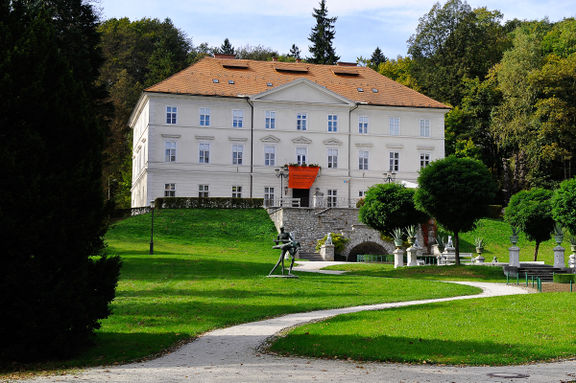Difference between revisions of "Tivoli Mansion"
| Line 21: | Line 21: | ||
{{Teaser| | {{Teaser| | ||
| − | Situated in the very heart of the Tivoli Park in Ljubljana, the [[Tivoli Mansion]] is a seat of the [[International Centre of Graphic Arts, Ljubljana|International Centre of Graphic Arts]] with a vivid programme of contemporary arts exhibitions, fine art printing centre, children workshops, and a café with a beautiful view over the terrace. The mansion serves also as the main venue for the internationally acclaimed [[Ljubljana International Biennial of Graphic Art]], established in 1954. Every 3rd Saturday in June the park attracts | + | Situated in the very heart of the Tivoli Park in Ljubljana, the [[Tivoli Mansion]] is a seat of the [[International Centre of Graphic Arts, Ljubljana|International Centre of Graphic Arts]] with a vivid programme of contemporary arts exhibitions, fine art printing centre, children workshops, and a café with a beautiful view over the terrace. The mansion serves also as the main venue for the internationally acclaimed [[Ljubljana International Biennial of Graphic Art]], established in 1954. Every 3rd Saturday in June the park attracts numerous visitors during the traditional [[Association of Slovene Museums#Muzejska_no.C4.8D event|''Museum Night'' event]]. |
}} | }} | ||
Revision as of 00:01, 24 December 2010
Background
The Tivoli Mansion was erected at the beginning of the 17th century by the Jesuit order on the site of the Podturn, a 15th-century fortified residence built by Baron Apfaltrer. Following the dissolution of the Jesuits in 1773 the mansion became firstly the summer residence of the Bishop of Ljubljana, and later the property of the Provincial States.
In 1835 the Ljubljana Kazina Society opened a summer amusement park here with an adjacent pub and café. It was then that the mansion was given its present name. In 1852 it was bought by the Emperor Franz Joseph and let on a lifelong lease to Austrian Field Marshal Joseph Radetzky, who gave it its present appearance. At this time the façade was redecorated in Classicist style and a number of new walking paths and gardens were opened to the public.
In 1865 Tivoli Mansion was purchased by the Municipality of Ljubljana and subsequently a pool with a fountain and a stairway decorated with tongueless dog statues were built in front of it. The dog statues were created by the sculptor Anton D. Fernkorn in around the year 1870. Thereafter until 1967 Tivoli Mansion was a residential building.
In the 1980s it was reconstructed in order to become the domicile of the International Centre of Graphic Arts, Ljubljana and a new venue for the traditional Ljubljana International Biennial of Graphic Art, till then organised by Museum of Modern Art.
See also
- International Centre of Graphic Arts, Ljubljana
- Ljubljana International Biennial of Graphic Art
- The traditional Museum Night event
- Municipality of Ljubljana



